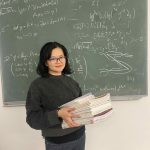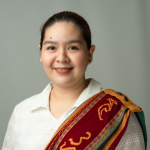PhD Data Science
College of Science
PhD Data Science Program
University of the Philippines, Diliman, Quezon City 1101 Philippines
The PhD in Data Science at the University of the Philippines aims to produce PhD graduates equipped with a good scientific mindset, with adequate technical skills, and a professional perspective of expanding the science of data, with data as carriers of information. Distinct from an MS degree holder, the PhD (Data Science) degree holder is expected to exceed the skills of those with a master’s degree in science (research).
The PhD graduate will therefore have a better integrative view of the field of data science beyond mastery of a specific chosen subfield. It is therefore typical of a PhD graduate to be able to defend the significance of a given research problem and the implications of a possible solution to other fields beyond its own. Results of a scientific study may also be found by a PhD to have entanglement with philosophy and our understanding of the true nature of things in a more holistic view.
At the end of the program, graduates are expected to:
1. Analyze the nature of data throughout its life cycle including the mechanism behind data generation and storage (domain knowledge base);
2. Apply multi-disciplinary theories and methods with their underlying philosophies for data analysis resulting from various phenomena and processes (data science application to domain);
3. Generate new data science theories, data models, architecture, and/or algorithms that can adapt to the evolving nature of data throughout its life cycle including generation, information representation, storage, and/or extraction (generation of new knowledge);
4. Apply data science solutions to real-world problems in collaboration with and/or among academic, industrial and public governmental institutions (collaboration in the application of data science); and
5. Practice ethical and lawful guidelines and policies related to the application of data science processes, methods and techniques, especially in the Philippine context (ethical practice).
This option is for those with a bachelor’s degree in the sciences and engineering, or in other fields relevant or data science. Under this program track, students are required to take graduate courses in mathematical, computational, and statistical methods. These courses, together with DS 301 (Foundations of Data Science), serve as foundational courses so students acquire the necessary minimum competencies to do advanced studies in data science. Compared to Option 2, this program track has more units required for elective courses. These additional units for electives allow the students to appreciate the many applications of data science and further their areas of interest (domain).
This option is intended for students with a master’s degree. Students applying for the program are expected to already have the necessary competencies to do advance studies in data science as well as the necessary background and skills in the practice of data science particularly in their domain expertise. Thus, relative to Option 1, this program track has fewer electives and does not require the foundational courses in mathematical, computational, and statistical methods. Applicants with master’s degree without the appropriate level of mathematical, computational, and statistical background may either opt to take Option 1 or enroll in non-degree course/s to attain the required level of competencies.
This one is for those with a graduate degree and are proven capable of doing independent research in data science or related disciplines. The student is required to have a research plan prior to enrollment into the program. Under this program track, the student is not required to take any elective course; instead, they shall be enrolled in laboratory and seminar courses to focus their work on research studies and/or publication requirements.
Notes:
*Master’s degree refers to Master’s degree in science or engineering with at least 24 units of graduate courses from a recognized institution of higher learning. Additional requirements will be imposed for those with professional master’s degree and/or may be required to take relevant credit courses before as non-degree being admitted to the program.
Table 1: Total number of units of the courses to be taken in the PhD DS program for different track options: Straight PhD (Option 1); Regular PhD (Option 2); and PhD by Research (Option 3). The requirements are also added for completeness of comparison. The Qualifying exam for Option 2 and Option 3 is waived due to MS degree.
Course Grouping/Requirements | Option 1 | Option 2 | Option 3 |
|---|---|---|---|
Core: DS 301: Foundations of Data Science | 3 | 3 | 3 |
Mathematical Methods (MATH 271.1) | 3 -5 | ||
Computational Methods (AI 221 or CS 280) | 3 | ||
Statistical Methods (STAT 207) | 3 | ||
Elective Courses | 21 | 9 | |
Special Topics in Data Science (DS 397) | 9 | 9 | |
Advanced Studies in Data Science (DS 398) | 8 | ||
Research Methods (DS 399) | 3 | 3 | |
Seminar Course (DS 396) | 1 | 1 | 3 |
Qualifying Examination | Required | ||
Colloquium | Required | Required | Required |
Candidacy Examination | Required | Required | Required |
Dissertation Proposal | Required | Required | Required |
Dissertation (DS 400) | 12 | 12 | 12 |
TOTALS | 58-60 units | 37 units | 26 units |
To apply to the PhD Data Science program, please check the Application and Admission section of the Graduate Student Guide of the College of Science: https://science.upd.edu.ph/graduate-student-guide/
Ready to apply for the upcoming 1st Semester, AY 2025-2026?: Click here.
To submit recommendation letters: Click here.
Dr. Ambrocio Melvin A. Matias
𝘈𝘴𝘴𝘪𝘴𝘵𝘢𝘯𝘵 𝘗𝘳𝘰𝘧𝘦𝘴𝘴𝘰𝘳, Institute of Biology
Dr. Arrianne Crystal Velasco
𝘈𝘴𝘴𝘪𝘴𝘵𝘢𝘯𝘵 𝘗𝘳𝘰𝘧𝘦𝘴𝘴𝘰𝘳, Institute of Mathematics
Dr. Aurelio de los Reyes V
𝘈𝘴𝘴𝘰𝘤𝘪𝘢𝘵𝘦 𝘗𝘳𝘰𝘧𝘦𝘴𝘴𝘰𝘳, Institute of Mathematics
Dr. Bernard Alan Racoma
𝘈𝘴𝘴𝘪𝘴𝘵𝘢𝘯𝘵 𝘗𝘳𝘰𝘧𝘦𝘴𝘴𝘰𝘳, Institute of Environmental Science and Meteorology
Dr. Bryan Hernandez
𝘈𝘴𝘴𝘪𝘴𝘵𝘢𝘯𝘵 𝘗𝘳𝘰𝘧𝘦𝘴𝘴𝘰𝘳, Institute of Mathematics
Dr. Daryl Allen Saddi
𝘈𝘴𝘴𝘪𝘴𝘵𝘢𝘯𝘵 𝘗𝘳𝘰𝘧𝘦𝘴𝘴𝘰𝘳, Institute of Mathematics
Dr. Deo Florence L. Onda
𝘈𝘴𝘴𝘰𝘤𝘪𝘢𝘵𝘦 𝘗𝘳𝘰𝘧𝘦𝘴𝘴𝘰𝘳, Marine Science Institute
𝘈𝘴𝘴𝘰𝘤𝘪𝘢𝘵𝘦 𝘋𝘦𝘢𝘯 𝘧𝘰𝘳 𝘙𝘦𝘴𝘦𝘢𝘳𝘤𝘩, Innovation Development and Enterprise, College of Science
Dr. Fredegusto Guido David
𝘗𝘳𝘰𝘧𝘦𝘴𝘴𝘰𝘳, Institute of Mathematics
Dr. Gervy Marie Angeles
𝘈𝘴𝘴𝘪𝘴𝘵𝘢𝘯𝘵 𝘗𝘳𝘰𝘧𝘦𝘴𝘴𝘰𝘳, Institute of Mathematics
Dr. Gil Claudio
𝘗𝘳𝘰𝘧𝘦𝘴𝘴𝘰𝘳, Institute of Chemistry
𝘋𝘪𝘳𝘦𝘤𝘵𝘰𝘳, Materials Science and Engineering Program
Dr. Giovanni A. Tapang
𝘗𝘳𝘰𝘧𝘦𝘴𝘴𝘰𝘳, National Institute of Physics
𝘋𝘦𝘢𝘯, College of Science
Dr. Isaiah Paolo A. Lee
𝘈𝘴𝘴𝘪𝘴𝘵𝘢𝘯𝘵 𝘗𝘳𝘰𝘧𝘦𝘴𝘴𝘰𝘳, National Institute of Molecular Biology and Biotechnology
Dr. Jasmin-Mae Luy
𝘈𝘴𝘴𝘪𝘴𝘵𝘢𝘯𝘵 𝘗𝘳𝘰𝘧𝘦𝘴𝘴𝘰𝘳, Institute of Mathematics
Dr. John Dale Dianala
𝘈𝘴𝘴𝘪𝘴𝘵𝘢𝘯𝘵 𝘗𝘳𝘰𝘧𝘦𝘴𝘴𝘰𝘳, National Institute of Geological Sciences
Dr. Johnrob Bantang
𝘈𝘴𝘴𝘰𝘤𝘪𝘢𝘵𝘦 𝘗𝘳𝘰𝘧𝘦𝘴𝘴𝘰𝘳𝘴, National Institute of Physics
𝘈𝘤𝘵𝘪𝘯𝘨 𝘋𝘦𝘱𝘶𝘵𝘺 𝘋𝘪𝘳𝘦𝘤𝘵𝘰𝘳 𝘧𝘰𝘳 𝘍𝘢𝘤𝘪𝘭𝘪𝘵𝘪𝘦𝘴, Intelligent Systems Center (ISC)
Dr. Jose Ernie Lope
𝘗𝘳𝘰𝘧𝘦𝘴𝘴𝘰𝘳, Institute of Mathematics
Dr. Laura T. David
𝘗𝘳𝘰𝘧𝘦𝘴𝘴𝘰𝘳, Marine Science Institute
𝘋𝘪𝘳𝘦𝘤𝘵𝘰𝘳, Marine Science Institute
Dr. Lillian Jennifer Rodriguez
𝘈𝘴𝘴𝘪𝘴𝘵𝘢𝘯𝘵 𝘗𝘳𝘰𝘧𝘦𝘴𝘴𝘰𝘳, Institute of Biology
Dr. Noelynna Ramos
𝘗𝘳𝘰𝘧𝘦𝘴𝘴𝘰𝘳, National Institute of Geological Sciences
Dr. Rachelle R. Sambayan
𝘈𝘴𝘴𝘰𝘤𝘪𝘢𝘵𝘦 𝘗𝘳𝘰𝘧𝘦𝘴𝘴𝘰𝘳, Institute of Mathematics
Dr. Renier Mendoza
𝘈𝘴𝘴𝘰𝘤𝘪𝘢𝘵𝘦 𝘗𝘳𝘰𝘧𝘦𝘴𝘴𝘰𝘳, Institute of Mathematics
𝘋𝘪𝘳𝘦𝘤𝘵𝘰𝘳, Computational Science Research Center
Dr. Rhudaina Mohammad
𝘈𝘴𝘴𝘪𝘴𝘵𝘢𝘯𝘵 𝘗𝘳𝘰𝘧𝘦𝘴𝘴𝘰𝘳, Institute of Mathematics
Dr. Ricky Nellas
𝘗𝘳𝘰𝘧𝘦𝘴𝘴𝘰𝘳, Institute of Chemistry
𝘌𝘹𝘦𝘤𝘶𝘵𝘪𝘷𝘦 𝘋𝘪𝘳𝘦𝘤𝘵𝘰𝘳, UP Intelligent Systems Center (ISC)
Dr. Victoria May P. Mendoza
𝘈𝘴𝘴𝘰𝘤𝘪𝘢𝘵𝘦 𝘗𝘳𝘰𝘧𝘦𝘴𝘴𝘰𝘳, Institute of Mathematics
- CS Form 5.3 Report of Qualifying Candidacy Exam
- DSP Form 1.0 Qualifying Examination Intent Form
- DSP Form 1.1 Dissertation Adviser’s Acceptance Form
- DSP Form 1.1.2 Change of Dissertation Adviser Form
- DSP Form 1.2 Conforme Candidacy Examination Committee Members Form
- DSP Form 1.3 Schedule Candidacy Examination Form
- DSP Form 1.4 DS 400 Enrollment Request Form
- Form 5.1 Endorsement of Thesis Dissertation Committee
- Form 5.3 Report of Qualifying Candidacy Exam
- Request for Thesis Dissertation Defense Schedule Form 2023
- Thesis and Dissertation Manual
- CS Graduate Thesis Format
























